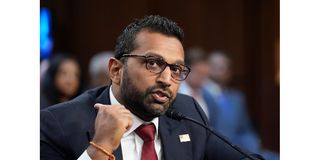Prime
FBI director with Tanzanian roots recounts his East African links

Newly appointed FBI Director Kash Patel
What you need to know:
- For Patel, his parents’ struggles instilled in him a deep respect for law and order—principles he has upheld throughout his career.
Dar es Salaam. Newly appointed FBI Director Kash Patel has opened up about his East African roots, drawing a poignant connection between his family's history and his approach to justice and governance.
Speaking during his appointment ceremony, Patel reflected on his parents' migration from Uganda and Tanzania, underscoring how their forced departure from Uganda under Idi Amin's regime shaped his worldview.
A family displaced by history
Patel's mother was born in Tanzania, while his father was born in Uganda.
Like thousands of Asians living in Uganda at the time, his family was forced to flee in 1972 when Idi Amin ordered the expulsion of the Asian community, an event that led to widespread displacement and economic upheaval. Many, including Patel's family, sought refuge in the United Kingdom, Canada, and the United States.
"My parents lost everything in a matter of days," Patel recounted.
"They had to start anew in a foreign land, and their resilience is the foundation of everything I stand for today."
The expulsion of Asians from Uganda, often referred to as Idi Amin’s “Indian genocide,” saw about 60,000 people forced to leave the country.
Many of these families had lived in East Africa for generations, having arrived during British colonial rule as traders, civil servants, or railway workers.
Despite their integral role in the region’s economy, they became victims of political upheaval.
How his family’s experience shaped his career
For Patel, his parents’ struggles instilled in him a deep respect for law and order—principles he has upheld throughout his career.
From his early days as a public defender to his later work in counterterrorism and intelligence, Patel has been a staunch advocate for justice.
"Growing up in a household where survival was an everyday lesson, I learned the importance of security, fairness, and justice. I saw what happened when a government turned against its own people," he said.
His legal career took him from Miami-Dade, where he worked as a public defender, to the US Department of Justice, where he became a national security prosecutor.
During this time, Patel handled cases involving international terrorism, including those linked to East Africa.
He later joined the Pentagon as a senior legal adviser and was instrumental in shaping US counterterrorism strategy.
A link to East Africa through counterterrorism
Patel's professional journey has brought him back to East Africa on several occasions.
As an international terrorism prosecutor, he worked on cases in Uganda and Kenya, among other locations.
His role involved tracking extremist networks and prosecuting individuals involved in acts of terrorism.
His understanding of East Africa’s complex security landscape, influenced by his family's history, has helped shape his approach to combating transnational crime.
Patel has spoken about how witnessing instability in the region strengthened his belief in strong, accountable governance.
"The rule of law is what stands between stability and chaos," he stated. "When governments fail to protect their people, justice must find a way."
The road to the FBI’s Top office
Patel's appointment as FBI Director is the culmination of a career marked by controversy and achievement.
He first gained national attention while serving as senior counsel for the House Intelligence Committee, where he played a key role in investigations into Russian interference in US elections.
Later, as a senior adviser to former President Donald Trump, he became known for his criticisms of the intelligence community and federal bureaucracy.
His book Government Gangsters detailed his belief that the US justice system had been compromised by partisanship.
Despite facing criticism for his views, Patel has remained steadfast in his commitment to reforming law enforcement institutions.
A historic appointment with global significance
As the first FBI Director of Indian-American descent with roots in East Africa, Patel’s appointment is historic.
His story mirrors the journey of many immigrant families who overcame displacement to contribute significantly to their new societies.
For Patel, his leadership at the FBI is not just about domestic security but about fostering international partnerships, including those with law enforcement agencies in East Africa.
"Security is global, and our partnerships must reflect that reality," he said.
His appointment has been met with mixed reactions. While some applaud his strong stance on law enforcement, others remain sceptical of his close ties to former President Trump.
Nonetheless, Patel has expressed confidence in his ability to lead the bureau with integrity and fairness.
With this appointment, Patel now ranks among the top five most powerful figures in US national security, standing alongside the Director of the CIA, the Secretary of Homeland Security, and the head of the Secret Service.
His position places him at the centre of critical security decisions that impact not just the United States, but global security as well.
As he assumes office, Patel has pledged to uphold the FBI’s mission while also addressing internal challenges within the agency.
He has emphasised the importance of rooting out corruption, protecting civil liberties, and strengthening the agency’s role in counterterrorism efforts.
"My parents’ journey from East Africa to America was not just a migration—it was a testament to survival, resilience, and the pursuit of justice," he said.
"That is the spirit I bring to this role."
His words resonate deeply with those who share similar backgrounds, highlighting the power of perseverance in the face of adversity.
As Patel takes on one of the most powerful law enforcement roles in the world, his East African heritage remains a central part of his story.




